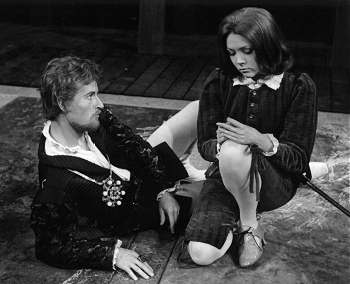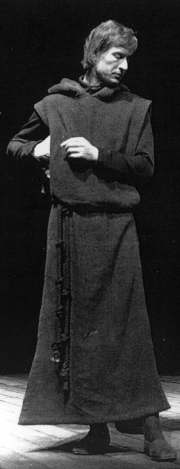After The
Belgrade......Joining Olivier's first season at Chichester in
1962......
"It was a marvellous company.........I enjoyed the
excitement of opening a new theatre, but...............I didn't work again for
a while after that first season. Then I heard rumours that I might be asked
back the next year but I couldn't be sure and as I needed the money I went into
the musical at the Mermaid, Virtue in
Danger. It was pretty disastrous for me because I couldn't really
sing and they had to keep cutting me out of the numbers. In the end I was only
allowed to sing when there were lots of other people on the
stage!"
On joining the RSC in
1966.......
|
"At first I found the company life difficult
to adapt to, and I was very nervous; when we started to rehearse
Twelfth Night I'd never met Diana Rigg (who was
playing Viola) and somehow I'm very bad about introducing myself so for a while
we just never spoke except in the play. Once I got to know the company better
that kind of tension disappeared, but there are still areas of self-protection
in any group of actors which is difficult.......to penetrate. |
 |
On playing
roles
The Guardian.
9.11.68.
"People come up to you and ask how you're going to
play a part........But it's an impossible question. It's like asking someone
how they are going to live their life for the next five years. The idea of a
smooth, consistent characterisation is rubbish. Stage characters should be
allowed as much inconsistency and variation as there is in
life......."
San Francisco
Chronicle, 6.3.69
How does an actor research a particular
part?.........."Some actors read as much as they can about a play. I try to
find out what a line actually means. Sometimes an elaborate technical
explanation makes no sense. Then two actors will try out the lines and suddenly
everything is clear."
Chichester Observer, 5.7.90.
"I always like best the part I'm playing now. That
makes me forget what I liked about other parts."
Oxford Mail,
30.3.70
On understudying and playing small roles at
Stratford and......
"In a way I think it's a good thing. I think it
might actually lead to an improvement in the quality of the acting. Whereas I
would refuse to play a small part in a scene with other actors who I knew were
no damned good I don't mind doing it for good actors who I know will do the
same for me in another play......."
......... on films
"If only actors were
more powerful they would never get themselves into the ludicrous position where
they can be offered a million dollars to play a part they know they can't
possibly be worth. Having been out of work for months on end myself I know how
difficult it is to resist a tempting offer."
|
Jewish Echo, 2.7.76
On playing
Henry V
"I enjoy doing Shakespeare a lot partly
because it's so difficult to do. There have also been great changes in the
ideas of how it should be played. Perhaps the biggest change of all, in the
best way, is that the modern parallels in the historical plays are brought out,
not over-emphasised, but allowed to emerge without cluttering it up or limiting
it by overall conceptions. The plays are so enormous anyway that they touch on
everything that was relevant then - and is still relevant now.
"Henry V has perhaps been usually considered
in a limited light - just as a piece of jingoistic tub-thumping. I think that
in the production that we have got together the play emerges as being very much
more considerable than that. It is about many other aspects than just the
problem of war, or nationalism. It is a play enormously about responsibilities
- self-responsibility - and about human conflict, decision-making, doubt. It's
also a play about people's word; whether men keep their word, the question of
honour in the truest sense, rather than either in a phoney, devious, political
or in a romantic expression.
"Henry V is about doubt, and overcoming doubt
and whether by taking action you necessarily simplify - in fact things can
become more complicated. The whole Shakespeare historical cycle of the
development of Prince Hal into the king is in many ways the odessy of a young
man having eventually to fulfil his role, to find himself and to marry the role
to his actual being, by discovering what his actual being is."
[Do audiences manage to reach these layers of
meaning?]
"There are many moments in Henry V which are
filled with doubt and I think that audiences do see or sense the dilemmas which
find their echoes today." |
Alan Howard on
Coriolanus - discussion
with David Daniell during the European tour and printed in 'Coriolanus In
Europe, David Daniell, Athlone Press, 1980.
Alan Howard on Soames Forsyte:
BBC R4, 29.9.90.
"He's cold, arrogant and slightly cruel, but in the
end I see him as a tragic figure."
The Independent,
28.11.90
Between The Lines / Alan
Howard discusses a favourite passage.
A marriage laid bare
"I can only speak for myself, but I think I love
you in my imperfect and slightly selfish way. I think, at times, you love me in
your stormy, emotional way - in fact, I think we love each other in an
imperfect, earthly way."
(Johann to Marianne, final scene, Scenes From A
Marriage by Ingmar Bergman, translated by Alan Blair.)
"Bergman's play goes straight to the heart of
modern marriage: it explores the sexual divide, the divergence between male and
female expectations of love - it asks whether that love can endure. Before
Johann and Marianne can reach the honesty of this final scene, they go through
hell. We see a marriage laid bare: the evasions, the accusations, the power
struggles, the guilt, the sexual torment - conversely, the humour, the
intimacy, the affection and the need. I find it a devastating portrait - and
this final reconciliation a very moving one. By the time it is made, husband
and wife are divorced, but remain lovers. I find this speech sad, wry and wise
- also hopeful. Johann recognises fallibility, the polarities of male and
female need. It's a realistic, not a romantic view - they have battled their
way to a love which may be imperfect, but which will endure."
Back to Scenes From A
Marriage Review


